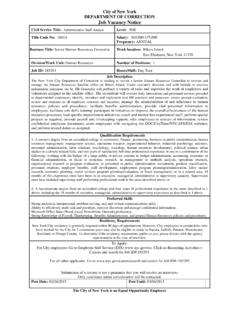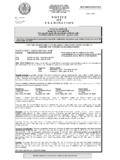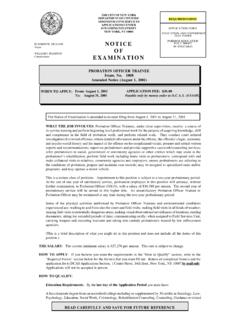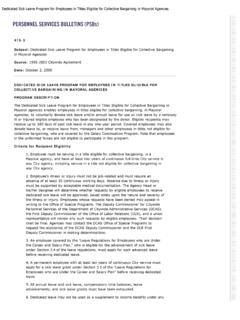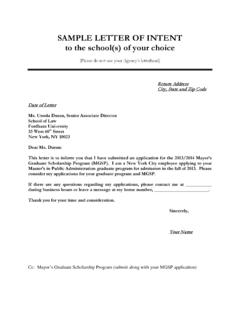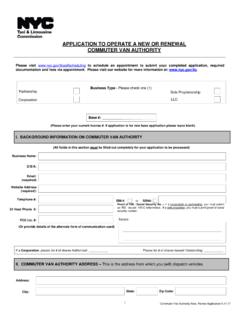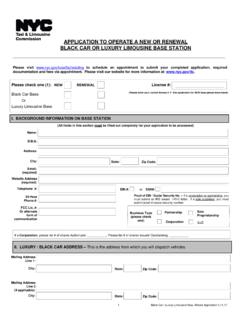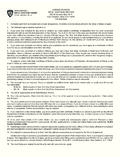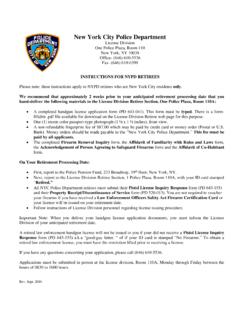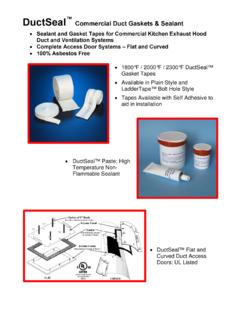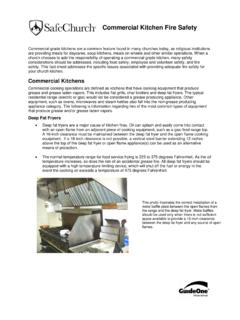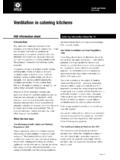Transcription of NYC BUSINESS SOLUTIONS
1 NNYYCC BBUUSSIINNEESSSS SSOOLLUUTTIIOONNSS Presents commercial LEASES: lease STRATEGIES FOR TOUGH TIMES .. OR ANY TIME Presented by: Stephen Falla Riff, Esq., Legal Aid Society, Community Development Project Rolando Gonzalez, Esq., Legal Aid Society, Community Development Project 2 Welcome to commercial Leases: Strategies for Tough Any Time! This packet is a supplement to the presentation and provides additional detailed information on the issues discussed. Table of Contents Issues to resolve prior to negotiating a lease 3 Important differences between commercial and 4 residential tenancies Negotiating the lease 5 Review of lease terms 5 Recording the lease 10 Types of claims Landlords may bring 11 commercial Tenant counterclaims and defenses 12 Bankruptcy 14 I.
2 ISSUES TO RESOLVE PRIOR TO NEGOTIATING THE lease 1. Select a Location: Depending on your company s needs, client base, programs, budget, the zoning rules, etc. Also make sure to take into account the location of potential competitors and the level of pedestrian traffic at the locale. A real estate broker can be useful in your search. Generally, they are paid by the landlord. 2. Assemble Advisors: Including real estate broker; attorney; contractor or architect; trade association; lenders; small BUSINESS assistance groups; development agencies; government agencies. 3. Determine Space and Facilities Needs: Including number of offices or cubicles; waiting room and reception area; restrooms; conference space; library; kitchen; associated spaces; lighting; ventilation; security; accessibility for people with disabilities; telephones and computer systems.
3 Building and other codes may dictate some of these matters. 4. Determine Operating Costs; Develop a Budget: What your organization or BUSINESS can afford to spend up-front for relocation costs, building-out the space, and insurance, and on an ongoing basis for rent, utilities and location-related operating expenses. Are you being asked to pay a share of the operating expenses for the building? If so, find out the owner s operating costs and confirm how they are calculating the tenant s share. Is the landlord offering free rent or contributing to tenant s initial improvement costs? 5. Investigate Ownership of the Building: To find out the ownership history of the building, and to review deeds, mortgages, mortgage satisfactions and financing statements, go to the on-line City Register at: Click on the hyper-link called Begin using ACRIS and follow the instructions.
4 6. Verify Applicable Zoning Restrictions: You must verify that your intended use of the space is acceptable under the applicable zoning rules. Zoning resolutions for every neighborhood in the five boroughs may be found at: 7. Determine the amount of property tax due on the building: Most commercial tenants are required to pay a share of the property tax due on the building. Go to the New York City Department of Finance website, select Property Taxes by Address and find out the amount 4 of tax due. You may also check this information at sure that you verify the taxes due for an entire tax year. Again, confirm how landlord is determining tenant s share. Is the passthrough on a net basis ( , tenant pays its share of the entire property tax bill) or gross basis ( , tenant pays its share of the property tax bill over a base year).
5 II. IMPORTANT DIFFERENCES BETWEEN commercial AND RESIDENTIAL TENANCIES 1. Generally: a. A commercial tenant s rights basically are limited to the rights set forth in the lease . Most leases are drafted by landlords and contain terms favorable to the landlord. b. Don t confuse commercial and residential tenancies. Residential tenants have numerous rights guaranteed by law. commercial tenants generally have few rights. In the commercial context, if a right or obligation is not in the lease , it is likely not enforceable. 2. Warranty of Habitability: a. Residential: By law, tenants are entitled to a decent, safe and sanitary apartment. b. commercial : There is no commercial warranty of habitability. Unless required by the lease , the Landlord does not have an obligation to maintain or repair your premises, or to maintain the common areas.
6 While commercial landlords must comply with codes and laws with respect to the building generally, commercial tenants usually take the premises as is. However, the Landlord does have an obligation to repair structural conditions that substantially impact the use and occupation of the premises. Ex: If the premises do not have heat or hot water for an extended period of time, the Landlord cannot collect rent during such time 3. Duty to Mitigate: a. Residential: If a tenant leaves a leased space before the term of the lease expires, a residential landlord has an obligation to make an effort to lease the space to a new tenant. 5 b. commercial : A commercial landlord does not have a duty to mitigate. A commercial landlord can collect the rent for the remaining part of the lease term from the tenant who vacated the space.
7 4. Rent Regulation: a. Residential: Some residential buildings are rent controlled and there is a ceiling on the amount of rent a Landlord can charge. b. commercial : There is no rent regulation in commercial spaces. Thus, once your lease expires, there is no limit on the rent the landlord can charge you, nor does the landlord have any obligation to offer you a lease renewal, if such an obligation is not written in the lease . III. NEGOTIATING THE lease 1. Prepare a term sheet or letter reviewing the landlord s proposed lease , and proposing revisions. The final term sheet is a summary of the fundamental lease terms agreed to by both landlord and tenant. (Please see the sample term sheet, distributed at today s workshop) 2. Remember: the written terms of the lease will govern any dispute between the tenant and the landlord.
8 If the landlord makes you a promise, insist that he or she include it in writing in the terms of the lease . Any oral agreements or promises made by the landlord will not be binding if they are not expressly included in the signed lease agreement. 3. Carefully review the lease . Consult your attorney and have them review the proposed lease before you sign it. You have no negotiating leverage after you have signed it. A review of the important provisions of a standard store lease follows below in Section IV. IV. REVIEW OF THE lease TERMS 1. Description of the Space You are Renting: a. Your lease will include a description of the space that you are renting. Usually the street address is sufficient. But if there is more than one space at the address, the lease must specifically state which space you are getting.
9 Often a diagram of the space is attached to the lease . 6 b. The lease must list any additional space that is included (for example storage, bathrooms, etc.). 2. Amount of the Rent a. The amount of the rent is totally negotiable. You and the landlord will sit down and work it out. There is no commercial rent regulation. The landlord may ask for as much rent as he or she wants. In this respect, a broker would be invaluable to the tenant as they are a source of market knowledge and would assist tenant in determining whether the asking rent is representative of the market. b. The rent usually goes up by a set amount every year during the lease term. The amount of the increase is stated in the lease . c. The landlord will ask for a security deposit. A typical deposit is two or three months rent but may be much more depending on the credit quality of the tenant.
10 It is fair to ask for reductions in the amount of security deposit tied to your performance ( , no missed or late payments for a period) at specified times during the term of the lease . d. Often, landlords will grant the tenant a free rent period while the tenant is making renovations to the space and readying it for occupancy. The length of the free rent period is fully negotiable, but is typically between 2 and 6 months. For retail leases, landlords typically try to further limit the free rent period by tying it to the opening of the tenant s BUSINESS . 3. Term of the lease and Option to Renew a. A typical commercial lease runs for 3 to 5 years. For retail leases, the term typically runs for 5 to 10 years because location is such an essential component of a retail tenant s success.
